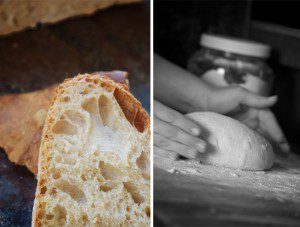Contributing Writer for Wake Up World
Jack Bezian of Bezian’s Bakery in Santa Monica, California, has an eye-catching sign behind his loaves of bread, stating: “Roman soldiers had only sourdough bread to get protein.” But this is only part of the story. For those who suffer from gluten intolerance or celiac disease, Jack’s naturally fermented bread is surprisingly easy to digest. Interestingly, several studies have also found true sourdough to be well tolerated by individuals sensitive to gluten.
Celiac disease is an autoimmune disorder triggered by consuming the protein in wheat, barley and rye – otherwise known as gluten. If a celiac ingests this protein, the immune system mistakenly attacks the villi in the small intestine, causing a cascade of health issues, including leaky gut syndrome, malnutrition, lactose intolerance, osteoporosis, neurological disorders and cancer.
[pro_ad_display_adzone id=”110028″]
Under normal circumstances, it’s necessary for individuals with a gluten sensitivity to completely eliminate the troublesome offender from their diet. However, two small studies involving sourdough bread give hope to the millions who believe they need to swear off gluten containing grains forever.
A European study of 17 celiac patients who consumed sourdough bread had an intriguing outcome. When the volunteers ingested a specialized sourdough containing lactobacilli culture, none of the participants exhibited any negative effects of intestinal permeability. The bread was made with 30 percent wheat flour and a combination of oat, millet and buckwheat flours. The researchers concluded, “These results showed that a bread biotechnology that uses selected lactobacilli, nontoxic flours, and a long fermentation time is a novel tool for decreasing the level of gluten intolerance in humans.”
Similarly, another study found that “individuals with celiac disease who ate specially prepared sourdough wheat bread over the course of 60 days experienced no ill effects,” writes Tasha Gerken in “Celiacs Can Say Yes to Sourdough Bread.”
Research published in Applied and Environmental Microbiology offers a possible explanation. Scientists discovered that, when wheat bread is thoroughly fermented, gluten content drops from approximately 75,000 ppm to 12 – a level technically considered gluten-free.
Not all bread is created equal
The key is a long fermentation process – up to a month with bakers like Jack Bezian. When bread is leavened naturally with lactobacilli, it transforms wheat flour into a nutrient-rich edible which is abundant in vitamins B, C and E, bioavailable protein, fatty acids and minerals. With true sourdough, bone and tooth destroying phytates are minimized as well.
In the post “Top 10 Reasons to Eat Real Sourdough Bread, Even if You’re Gluten Intolerant” Jack relates a story about how a celiac customer tried his traditional sourdough bread and discovered he could eat it without any adverse reactions.
Jack believes it’s important to knead the bread thoroughly and allow it to ferment for a lengthy stretch of time. There are no shortcuts here, but if you have an issue with gluten and miss the joy of bread, a true sourdough may be the answer.
Updated September 2014
Article Sources:
https://web.archive.org/web/20230401015709/http://cheeseslave.com/
http://science.naturalnews.com
http://science.naturalnews.com
Previous articles by Carolanne:
- Live Your Bliss by Boosting Brain Dopamine Levels
- Confirmed by Science: You Really Can Change Your DNA – Here’s How
-
Chemtrails: Learn How to Protect Yourself From These Treacherous Poisons
- Kick the Caffeine Habit and Feel Better Quick with these Natural Alternatives
-
Yet Another Reason to go Organic – Research Verifies it Really is More Nutritious
- Top 10 Food Frauds: Formaldehyde, Plastic, Melamine & Caustic Soda Found in Common Foods
- Autistic Boy With Higher IQ Than Einstein Discovers Gift After Removal From State-Run Therapy
-
Enhance Spiritual, Mental and Physical Well-being with a Pineal Gland Detox
[pro_ad_display_adzone id=”110025″]
Please note: this article was first published on Natural News.
[pro_ad_display_adzone id=”110027″]







